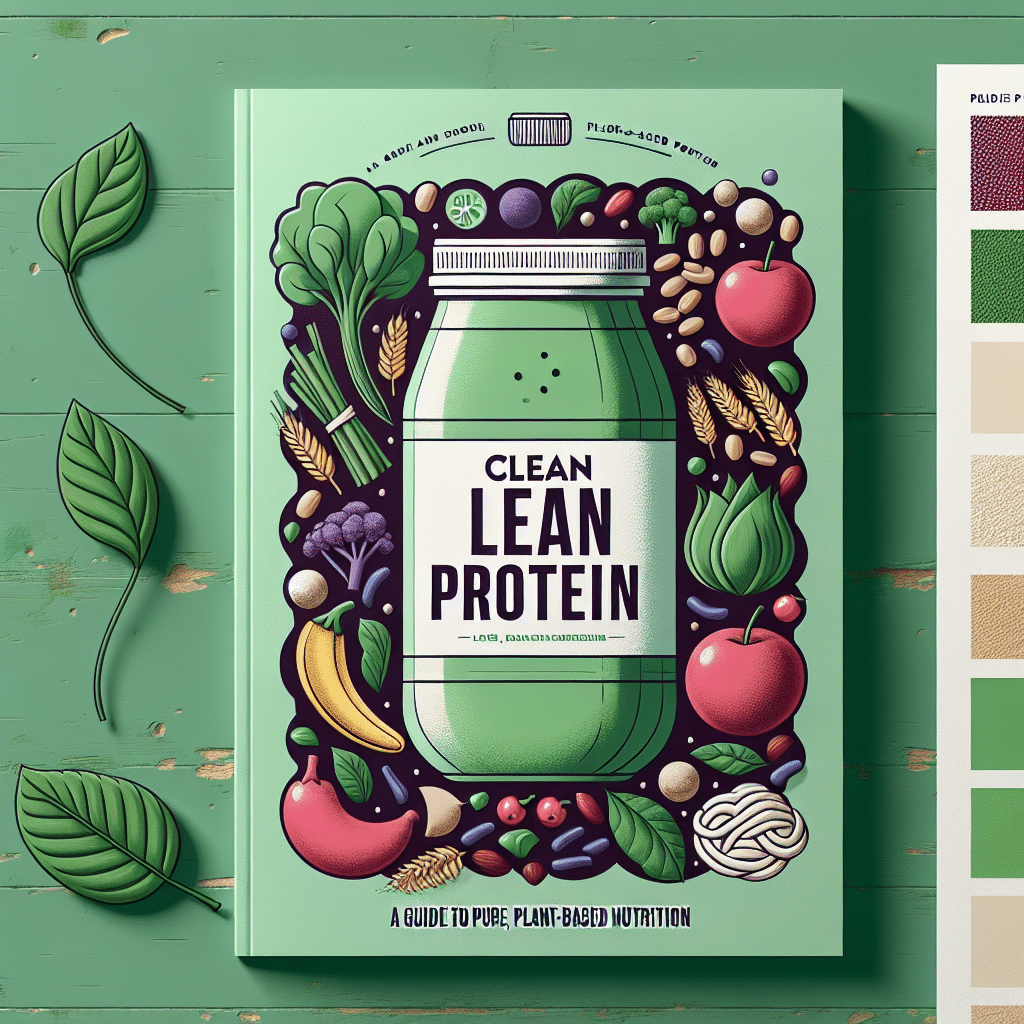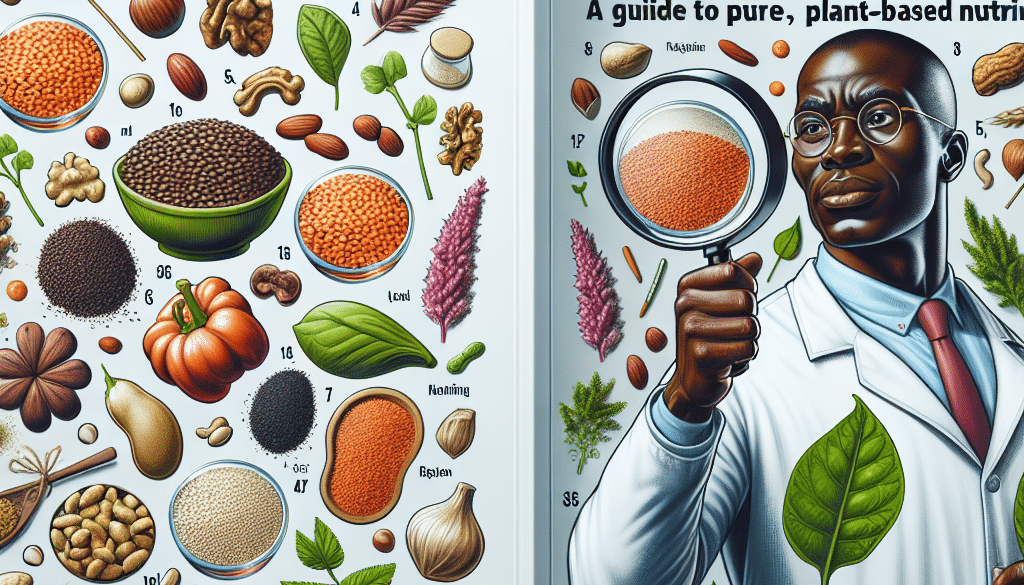Clean Lean Protein: A Guide to Pure, Plant-Based Nutrition
-
Table of Contents
- Clean Lean Protein: Your Ultimate Guide to Plant-Based Nutrition
- Understanding Clean Lean Protein
- The Benefits of Plant-Based Proteins
- Top Sources of Clean Lean Plant-Based Protein
- Incorporating Clean Lean Protein into Your Diet
- Case Studies and Statistics
- Challenges and Considerations
- Conclusion: Embracing Plant-Based Proteins for a Healthier Future
- Discover ETprotein’s Premium Plant-Based Protein Products
Clean Lean Protein: Your Ultimate Guide to Plant-Based Nutrition

As the world becomes increasingly health-conscious, the demand for clean, sustainable, and nutritious food sources is on the rise. Clean lean protein, particularly from plant-based origins, has emerged as a powerhouse in the realm of health and wellness. This guide delves into the world of pure, plant-based nutrition, offering insights into its benefits, sources, and how to incorporate it into your diet effectively.
Understanding Clean Lean Protein
Clean lean protein refers to protein sources that are low in fat, free of contaminants, and derived from plants. Unlike their animal-based counterparts, plant proteins are often associated with lower risks of chronic diseases and are considered more environmentally sustainable. They are an essential component of a balanced diet, contributing to muscle repair, hormone production, and overall health.
The Benefits of Plant-Based Proteins
- Health Advantages: Studies have shown that plant-based diets can reduce the risk of heart disease, diabetes, and certain cancers. Plant proteins are also rich in fiber, vitamins, and minerals, which are crucial for optimal health.
- Environmental Impact: Plant-based proteins require less water, land, and energy to produce compared to animal proteins. They also generate fewer greenhouse gases, making them a more sustainable choice for the planet.
- Animal Welfare: Choosing plant-based proteins supports a cruelty-free food system, avoiding the ethical concerns associated with animal farming.
Top Sources of Clean Lean Plant-Based Protein
There is a wide variety of plant-based proteins available, each with its unique nutritional profile. Here are some of the top sources:
- Legumes: Beans, lentils, and chickpeas are excellent sources of protein and fiber.
- Nuts and Seeds: Almonds, chia seeds, flaxseeds, and hemp seeds are not only protein-rich but also contain healthy fats and omega-3 fatty acids.
- Whole Grains: Quinoa, buckwheat, and amaranth offer a complete protein profile, containing all nine essential amino acids.
- Soy Products: Tofu, tempeh, and edamame are versatile soy-based proteins that can be incorporated into various dishes.
- Green Vegetables: Spinach, kale, and broccoli provide a modest amount of protein along with a host of other nutrients.
Incorporating Clean Lean Protein into Your Diet
Adopting a diet rich in plant-based proteins can be simple and delicious. Here are some tips to help you get started:
- Start Small: Begin by incorporating meatless meals a few times a week and gradually increase as you become more comfortable with plant-based options.
- Experiment with Recipes: Explore a variety of recipes that highlight plant proteins, such as lentil stews, tofu stir-fries, and quinoa salads.
- Plan Your Meals: Ensure you’re getting a balanced intake of proteins, carbohydrates, and fats by planning your meals ahead of time.
- Snack Smart: Choose protein-rich snacks like hummus with vegetables or a handful of nuts to keep you satiated between meals.
Case Studies and Statistics
Research and real-world examples underscore the benefits of plant-based proteins. For instance, a study published in the American Journal of Epidemiology found that replacing red meat with plant protein is associated with a lower risk of mortality. Additionally, the rise in popularity of plant-based diets is evident in market trends, with the plant-based protein sector projected to reach $14.5 billion by 2025, according to a report by MarketsandMarkets.
Challenges and Considerations
While the benefits of clean lean protein are clear, there are some challenges to consider:
- Protein Quality: Not all plant proteins are complete, meaning they don’t contain all essential amino acids. It’s important to consume a variety of protein sources to ensure a complete amino acid profile.
- Nutrient Absorption: Some plant proteins contain antinutrients that can inhibit the absorption of minerals. Proper preparation methods, such as soaking and fermenting, can help mitigate this issue.
- Taste and Texture: Those new to plant-based proteins may need time to adjust to the different tastes and textures. Experimentation with seasonings and cooking techniques can enhance the appeal of these foods.
Conclusion: Embracing Plant-Based Proteins for a Healthier Future
In conclusion, clean lean protein from plant-based sources offers a multitude of health, environmental, and ethical benefits. By incorporating a variety of legumes, nuts, seeds, whole grains, soy products, and green vegetables into your diet, you can enjoy these advantages while contributing to a more sustainable future. With the growing availability of plant-based options and the increasing creativity in vegetarian and vegan cuisine, it has never been easier to embrace a diet rich in clean lean protein.
Discover ETprotein’s Premium Plant-Based Protein Products
If you’re looking to enhance your diet with high-quality plant-based proteins, ETprotein offers a range of exceptional products. Their organic rice protein, clear pea protein, and other plant-based options are perfect for those seeking pure, allergen-free, and non-GMO protein sources. Catering to various industries, ETprotein ensures that you have access to the best plant proteins for your nutritional needs. To explore their offerings and sample their products, reach out to ETprotein today.
About ETprotein:
ETprotein, a reputable plant protein vegan protein Chinese factory manufacturer and supplier, is renowned for producing, stocking, exporting, and delivering the highest quality organic bulk vegan protein and plant proteins. They include Organic rice protein, clear rice protein, pea protein, clear pea protein, watermelon seed protein, pumpkin seed protein, sunflower seed protein, mung bean protein, peanut protein etc. Their offerings, characterized by a neutral taste, non-GMO, allergen-free attributes, cater to a diverse range of industries. They serve nutraceutical, pharmaceutical, cosmeceutical, veterinary, as well as food and beverage finished product distributors, traders, and manufacturers across Europe, USA, Canada, Australia, Thailand, Japan, Korea, Brazil, and Chile, among others.
ETprotein specialization includes exporting and delivering tailor-made protein powder and finished nutritional supplements. Their extensive product range covers sectors like Food and Beverage, Sports Nutrition, Weight Management, Dietary Supplements, Health and Wellness Products, and Infant Formula, ensuring comprehensive solutions to meet all your protein needs.
As a trusted company by leading global food and beverage brands and Fortune 500 companies, ETprotein reinforces China’s reputation in the global arena. For more information or to sample their products, please contact them and email sales(at)ETprotein.com today.












